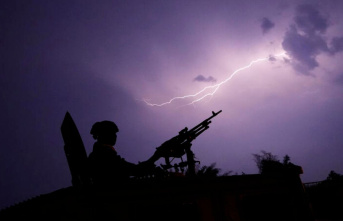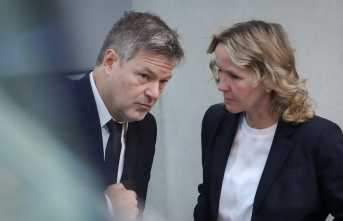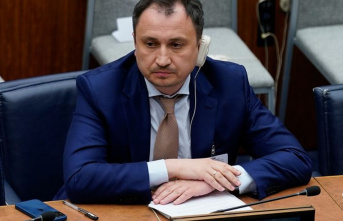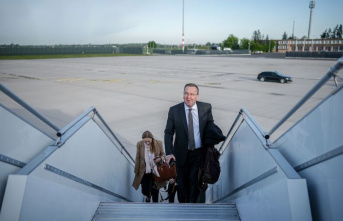The results of the marathon coalition round on climate and infrastructure policy met with a mixed response. Environmentalists sharply criticized the decisions of the SPD, Greens and FDP and spoke of a step backwards for climate protection. The German Association of Towns and Municipalities, the Pro-Rail Alliance and Veronika Grimm, on the other hand, praised the compromises.
The coalition committee had agreed on a common course in climate and infrastructure policy on Tuesday evening. The resolutions provide for faster planning processes for major infrastructure projects, including 144 highway projects, as well as for rail, power grids and renewable energy. The train should get more money. In the course of a reform of the truck toll, additional income is to be used predominantly for investments in rail. So far, revenue from the truck toll has only been used to build long-distance roads.
The Climate Protection Act is to be changed in key points. The strict annual sector targets for greenhouse gas emissions, for example for transport or the building sector, are to be relaxed. In the future, it should be possible to compensate for missed targets in one sector in another. In the case of interventions in nature and the landscape, for example through the construction of wind turbines or roads, not only should land be compensated, but money should also be paid as compensation in the future. In the heating sector, the coalition partners waived a ban on oil and gas heating. "There will be no obligation to replace existing heaters, only specifications for newly installed heaters," said FDP leader Christian Lindner.
The German Environmental Aid (DUH) criticized the planned softening of the Federal Climate Protection Act as a catastrophe. "This anti-climate protection coalition" sins against all future generations, explained DUH federal manager Jürgen Resch. "In the transport sector, the horror news can hardly be counted, including a whopping 144 accelerated motorway construction projects and the planned de facto equal treatment of combustion engine cars with electric vehicles," he criticized. Resch called on the members of the Bundestag to "flatly reject" the "planned deterioration".
Greenpeace also slammed the traffic light agreement: "By giving up the obligation to implement each individual sector goal, Chancellor Scholz (...) is acknowledging that his party's greatest climate policy success, the Climate Protection Act, will be gutted," explained Martin Kaiser, CEO of Greenpeace Germany. "If 144 additional climate-damaging motorway projects are to be paved through the country at an accelerated rate, the climate will be further driven into the wall." The "traffic light marathon" even set back climate protection in important areas.
The Germany Nature Conservation Union expressed similar criticism: With the softening of the sector targets, the traffic light government is falling behind the level of ambition of the previous government, criticized Nabu President Jörg-Andreas Krüger.
The social association VdK and the child protection association, on the other hand, complained about the lack of an agreement on the financing of the planned basic child security.
Praise came from the Pro-Rail Alliance. Its managing director Dirk Flege welcomed the fact that the railways should receive more money and that funds from the truck toll should also flow for this purpose. "Finally, the compulsion to invest the truck toll revenue in federal trunk roads has been abolished. Now you can invest in environmentally friendly alternatives, that's a huge step forward," said Flege.
The German Association of Towns and Municipalities praised the agreements on the transport sector as a whole and also the fact that further investments are being made in road construction. "Germany will still be dependent on automobility for a very long time. It will take decades to expand the rail network - including the European one - in such a way that the volume of rail transport can increase significantly," said CEO Gerd Landsberg of the "Rheinische Post".
The Grimm economy also spoke of a positive result, also in terms of climate protection. "It's a good idea to finance the expansion of rail through a truck toll," Grimm told the Rheinische Post. "Reforming the climate protection law with a view to temporal and intersectoral flexibility is also a good thing - provided the emission reduction targets are met," she added. "In the building sector, it has apparently also been possible to clear up the negative aspects. All of this should not lead to the mood turning against climate protection," Grimm analyzed. "The results encourage that the coalition is capable of action. An important signal."
Naturally, the traffic light coalition was also satisfied with their decisions. SPD leader Lars Klingbeil spoke in the ZDF "heute journal" of a large modernization package that will change the country over the next few decades. He was also willing to "sit down at a table for two days". Klingbeil confirmed that the coalition has a common interest in advancing climate protection, expanding infrastructure projects and also drastically reducing planning and approval times. In the ARD "Tagesthemen" the SPD boss said that many of the resolutions would come to parliament very quickly.
Economics Minister Robert Habeck (Greens) called the package of measures for the railways and heavy goods traffic "very massive". Habeck admitted in the ZDF program "Markus Lanz" that the acceleration of planning for motorway projects was not easy for his party, but was part of the compromise process. "That was not a wish of the Greens," said Habeck. But it is important that problems have been solved.
FDP parliamentary group leader Christian Dürr rated the results of the coalition committee as groundbreaking. "Together, the coalition has agreed on a comprehensive modernization and acceleration package that means a true paradigm shift," Dürr told the German Press Agency. The pace of planning and approval procedures will continue to increase. The climate protection law will be transferred from the "planned economy to the market economy". The coalition has also committed to openness to technology.
Left and AfD, on the other hand, cannot see anything good about the traffic light decisions. Left parliamentary group leader Dietmar Bartsch told the news portal t-online: "Increasing the truck toll does not make a total work of art, but is a debacle for the traffic light government and a chancellor with continued weakness in leadership." At the same time, Bartsch accused the traffic light coalition of "nebulous announcements" and called it "disgraceful".
Like Bartsch, the parliamentary group leaders of the AfD, Alice Weidel and Tino Chrupalla, also criticized the fact that the planned ban on the installation of new oil and gas heating systems is not yet off the table. They called the results of the coalition talks "poor" overall.











